 |
|
August 31, 2006
Happily Dead Ended

Iacobellis marks the spot where a much-wanted cul de sac is going, at Kenwood and Sherman avenues. Photo/Sharon Bass
By Sharon Bass
Joanne Iacobellis never liked the amount of traffic that goes up and down her otherwise quiet Kenwood Avenue. Many use it as a cut-through to get to the Dunkin Donuts on Whitney, she said. But upon learning that Quinnipiac University was building a nearby campus on Rocky Top, which will create even more traffic, the concerned citizen turned citizen activist.
She and her Kenwood Valley Neighborhood Association spent the last two years begging the town to create a cul de sac at either end of Kenwood to end its cut-through days. And now they’re getting their dead end.
The town recently put the project out to bid and two offers came in this week, said Mayor Craig Henrici. One is for $6,400; the other over $15,000. The bid was only for a civil engineer to design a plan for “the Abandonment of Kenwood Avenue at Sherman Avenue, Hamden, CT.” Quinnipiac is kicking in for the much costlier construction.
“I made that a campaign promise last year at their civic association meeting,” Henrici said. “The Sherman Avenue campus is significant in size, to say the least. And Kenwood Drive is a peaceful neighborhood and shouldn’t be used as a cut-through to Sherman Avenue or Dunkin Donuts.”
It’s likely that a small chunk of land belonging to Mt. Carmel Congregational Church will have to be taken through eminent domain, the mayor said, in order to make the cul de sac.
Iacobellis said she wanted it in place by January, when the new sports facility on Rocky Top is to open. Henrici said he didn’t know if that’s possible.
“We might have to settle for the police blocking off the street when there’s a [sports] event,” said Iacobellis, who last year gave birth to an off-campus student housing watchdog group, Concerned Citizens for Hamden Neighborhoods. “And the events happen frequently. One night it’s basketball and one night it’s hockey. Will it be used a lot? Absolutely.”
But she said she’s grateful about getting the cul de sac, regardless of when it’s done, and credited Henrici for moving the project along and “having it come to fruition. Without his support we wouldn’t have gotten where we’ve gotten.”
By 2008, 1,867 dorm rooms are supposed to be built on the Rocky Top campus. This month Whitney Village, an apartment house at 3075 Whitney Ave., was turned into a 145-bed dorm. And by next August, another 336 beds are expected to be ready on the main campus. QU officials agreed to build more dorms in response to complaints about too many students living in the neighborhoods.
August 28, 2006
The Face of Street Success
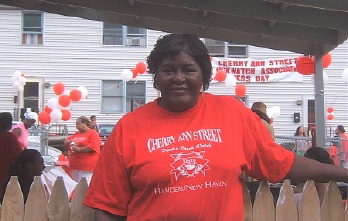
Connie Vereen.
“New Hamden’s” block-watch queen throws her 11th annual shindig
Story and photos by Sharon Bass
Lorraine Dudley moved to Cherry Ann Street from Bridgeport last September. She said only in her dreams did she imagine something like last Saturday’s double-block watch party. It was her first.
“I’ve only seen things like this on TV,” said Dudley, the newest block watch captain. “It’s beautiful.”
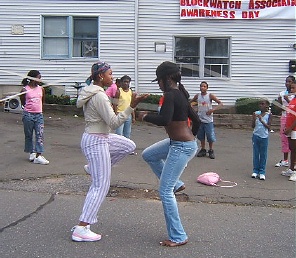

Kids skip double dutch on the street; others go behind Vereen's house for kickball.


A very limber girl walks in New Hamden. Eugene Henneghan in mid air.
All around her, children played, parents mingled, a huge grill donated by police Sgt. Gabe Lupo cooked up tons of burgers and dogs and chicken. Mayor Craig Henrici, his top aide Scott Jackson, state Rep. Peter Villano (D-Hamden), Police Chief Tom Wydra and other Hamden cops, 5th District Councilman Willie Mewborn (Cherry Ann is in the 3rd) and New Haven police and Alderman Charles Blango stopped by to join in the celebration of another year well done.

New Haven Sgt. Romano Ratti is smoking a lot of meat.
The north side of Cherry Ann is in Hamden. The south side, New Haven.
But to Connie Vereen, who lives on the Hamden side, they’re both in “New Hamden.” She opens her yard to New Hamdenians every year for a huge, vibrant party, complete with DJ Trife Good, loads of helium balloons, tons of food and conversation. She also opens her yard during the rest of the year to the dozens of kids on her block who have nowhere else to play.

That's right, DJ Trife Good.
“Everybody was telling me to move to Hamden. It’s nice and quiet,” said Vereen. So in 1995 she moved out of New Haven and bought a house on Cherry Ann, a two-block street that goes from Dixwell Avenue to a dead end. She didn’t know she had only partly moved into Hamden. Her street was rife with drugs and crime and litter, she said.
Vereen fought it. One year later, with Lupo’s help -- and neighbor power -- she kicked off what would become the area’s most exciting and effective block watch. She assembled captains from all over New Hamden. She established an every-other-week street cleanup for kids and adults. There aren’t many fast-food wrappers or empty butt packages on their street.
“You can keep the bad guys away if you keep your own neighborhood clean,” Vereen said.
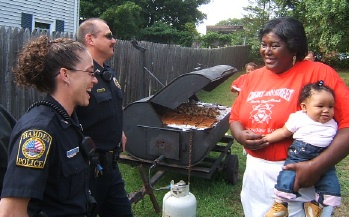
Connie Vereen with her 4-month-old granddaughter, Destiny, hangs with Hamden cops Dawn Correia and Sgt. Frank Riehl.
In 2004, Vereen was made a Hamden Notable for her successful street effort.
Back at the Party
Block captain Gwendette Hinton gave awards to 40 kids during Saturday’s celebration for participating in the cleanups. A few individual awards were also issued for exceptional accomplishments. LaDietra Cohen, a student at New Haven charter school Amistad Academy, got one for making valedictorian. Anthony Outlaw, who attends Hamden magnet school Hyde Leadership, was awarded for being named the MVP on his football team.
“We are not New Haven or Hamden,” said Belinda Hannon, Anthony’s mom. “We are New Hamden.”

The Hintons. Block watch captain Gwendette (center), daughter Dominique and son Gregory Jr., a Dunbar Hill student.
“It’s awesome,” Dominique Hinton, 12, said of New Hamden. “There’s more friends to party with. There’s no violence, nothing here.” Dominique is entering Hamden Middle School next Tuesday. Her mother is captain Gwendette.
“We refuse to be separated. We refuse to be separated,” Vereen said walking inside her home to take a requested break from the party din outside.
Her main gripe is nothing new. She wants a park for the 80-something children who live in New Hamden. (Vereen’s children are grown.) “We have no place here for the kids to play,” she said. “No parks, no recreation center.” They sometimes play in her yard but that makes her nervous. “It’s kind of hard to let them play in the back yard because you’re liable, you know.”
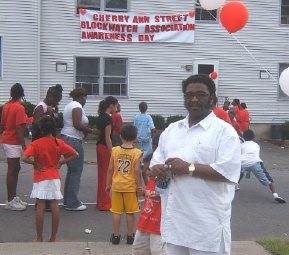
Councilman Willie Mewborn on his second visit of the day to the New Hamden party.
New Haven owns the land where a park could be developed, at Cherry Ann’s dead end. Vereen said she’s talked with that city many times about it but her words seem to fall on deaf ears.
“If they could acknowledge the amount of kids we have on Cherry Ann Street and the need for them to be safe. [Alderman] Blango tries to help, but I think the park goes a little beyond that,” she said.

Party's over. Cleanup begins.
Park or no park, Vereen has energized her neighbors to take control of their street instead of vice versa. And she is thanked. She said the New Haven police donated bags of school supplies for Saturday’s celebration. Hamden police gave gift certificates for the kids. Neighbors cooked homemade food. Stop & Shop threw in a $30 gift certificate. And Vereen said she spent $768.32 of her own moolah on decorations, food, bottles of water and soda and back-to-school bags.
The distinguished woman is also thanked, year round, in words and hugs and kisses. "I love the kids and they love me. They're wonderful," she said.
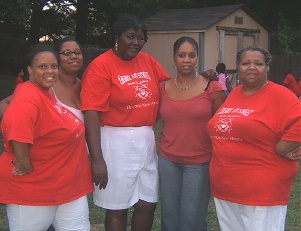
The New Hamden block-watch captains (from left): Hinton, Belinda Hannon, Vereen, Lorraine Dudley and Dorothy Moye.
August 18, 2006
Hype or Hope?
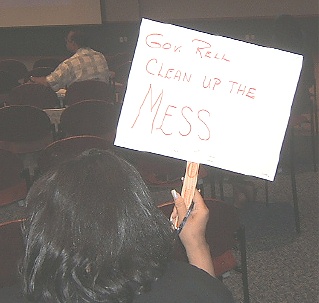
One of many signs residents held up during last night's meeting at SCSU.
The DEP finally unveils its remediation proposal for Newhall
Story and photos by Sharon Bass
The message they wanted to hear was not the one delivered. Not for anyone. Not for the folks who live within the Newhall consent decree boundaries and want a thorough cleanup of their ’hood – a former dumping grounds since the 19th century. And not for the folks who live just outside the lines and want their yards and trees left alone.
Many had waited years for the state to unveil a remediation plan. Last night, they got it. Newhall residents, local and state politicians and community activists gathered in Southern Connecticut State University’s student center to listen to Department of Environmental Protection Commissioner Gina McCarthy outline the proposal -- and then to respond.
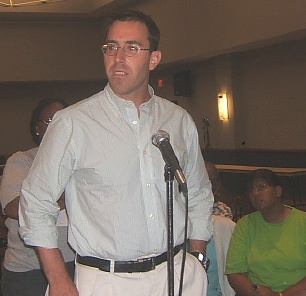
Keith Darden questions the alleged health risks.
“This is not a solution. This is not a remedy,” said Keith Darden, who lives on Morse Street, right outside the consent area, after McCarthy’s presentation. He told the panel of DEP and state Public Health officials that the levels of contamination are not nearly as serious as they’re painted to be, and that much less remediation is needed than their $62 million to $72 million proposal calls for.
“I really need some comfort,” a woman said.
“Give back this neighborhood what was taken from it,” bellowed Abdul Hamid, a vocal member of the Newhall community. “You are public servants. You are supposed to protect us. We want 100 percent cleanup. Come and demolish my house but you will build a new house for me! We will prove to you that all the poor people who have died in my neighborhood” did so because of the contaminated soil.
“99 percent are minority people,” Hamid continued despite being asked to stop so others lined up behind the two microphones could get a turn. “If this was in the commissioner’s neighborhood it would have been cleaned up! This is adding insult to injury!”
“That’s right! That’s right!” a few from the audience yelled out.
“My question is simply this,” said a calmer Hamid, “What is the motive behind the plan?”
The Plan
The DEP had promised to send the “Proposed Remedy Selection Plan Newhall Remediation Project” to affected property owners two days before the public meeting at SCSU. But the plan didn’t arrive in people’s mailboxes until yesterday, giving them little to no time to review it beforehand.
“You are now a community that has lived with contamination for too long,” Commissioner McCarthy addressed the one-third empty room. She called the proposal a “safe, permanent and feasible remedy.”
Giving an historical snapshot of the situation, she said contaminants like lead and arsenic were discovered in 2000 when the old middle school on Newhall Street was about to be expanded. Four responsible parties were identified: Olin Corporation, for the waste dumped by the Winchester gun factory, which Olin since bought; the Regional Water Authority; the town of Hamden; and the state. A consent order was drawn up in April 2003 making Olin and the state responsible for the private properties; the RWA for the middle school; and the town for Mill Rock Park and Rochford Field. Since then, McCarthy said over 2,500 soil and groundwater samples were taken, and the structural integrity of 119 homes checked. In 2005, testing went beyond the consent order lines.
Meanwhile, the state has been investigating the DEP for awarding the work without a contract to an outside environmental firm, Loureiro Engineering Associates. And how millions of tax dollars were spent on a project that doesn’t have a final plan in place.
“It’s a health risk. We cannot allow that threat to continue unabated,” McCarthy said.
Here’s what the DEP came up with (residents have 60 days to respond before the plan is finalized):
- Remove 4 feet of waste fill and replace it with clean topsoil on 99 residential properties (10 are outside the consent area).
- Do the same on another 137 properties. But unlike the 99, these are said to have contaminants deeper than 4 feet, so an environmental land use restriction would be put on them disallowing excavation of more than 4 feet without DEP approval.
- Cap the grounds of the old middle school and the two parks.
- Take down 119 homes that have severe structural damage. “We know, and you know, that there are homes in that community that can’t be fixed,” said McCarthy.
Another major concern is where the excavated contaminated soil would go. McCarthy said Olin wanted to dump it behind the middle school. “We don’t believe that is legal,” she said.
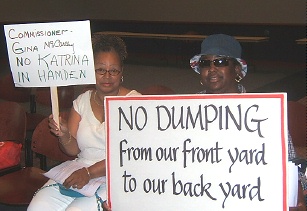
Venus Walker (left) and Desiree Penn live on Newhall Street.
The audience moaned. Handmade signs were held high during the entire two-and-a-half-hour meeting. “Commissioner McCarthy: Clean up the Mess Don’t Dump on Us.” “Protect Our Children.” “Clean Our Neighborhood Permanently.”
McCarthy made many pleas for money during her presentation. Democratic state Sens. Martin Looney and Joe Crisco and Reps. Peter Villano (D-Hamden) and Brendan Sharkey (D-Hamden) sat together in the front row. The commissioner looked at them each time she said the state Legislature needs to cough up the funding.
“We know this will be a phased cleanup that will take a number of years,” she said. “Make no mistake about it. It’s not going to be fun. I am asking for your permission to protect public safety.”
Health Risk?
Some rezzies said they or others they know have gotten sick living atop the landfill. One woman said she regularly played in the dirt as a child and developed learning disabilities. Others, like Darden, feel the risks are way overblown.
The chances of getting sick from the lead and arsenic are about one in a million, Darden said, and that’s if one eats a small amount of the dirt every day for 25 years.
“My chance of being hit by lightning is one in 20,000,” the Morse Street resident said. “I can live with that risk.” He accused the DEP of creating hype in order to drum up business for its contractors.
Meg Harvey, of the public health department, said there’s really no concern about cancer. Arsenic causes cancer, she said, but in most areas the levels are not high enough. Also, Hamden cancer statistics indicate there have been no environmentally induced cancers.
“What we’re concerned about with children especially is exposure to lead and delays in learning,” she said.
Justine Hastings of Bryden Terrace approached the mic. “I thought Mr. Darden made some excellent points about the risk of public health,” she said. He offered more specific information than the state did, she said.
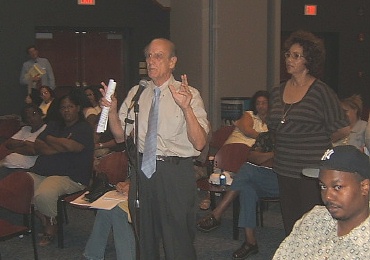
Peter Villano tells the commish exactly what he thinks of her cleanup proposal.
Rep. Villano also approached the mic. He looked upset. “Public participation has failed,” he said to McCarthy. He, Darden and Hamid are members of the Newhall Advisory Committee, a group led by a DEP-paid attorney that meets monthly.
“The only major recommendation NAC made to the commissioner was for total removal [not just 4 feet],” he said. “So public discussion meant nothing. We’re not being paid attention to.
“We’re supposed to be partners with the DEP. We [NAC] should have been considered with the drafting of the plan,” Villano continued. “If you want the support of the Legislature, as much as I can influence it, then partner with use for the final product.”
“This has been a very sad evening,” said Antoinette Oliveria of Dudley Court. “It’s clear there’s so much frustration. My main concern is property values if an ELUR [environmental land use restriction] is put on land records, property owners should get a tax abatement.” She said she too was disappointed with the state proposal.
Afterwards, Mark Yeckel of Morse Street said the plan is “dead on arrival. This meeting was for the politicians. They [DEP] need the money. This wasn’t for the community.”
“The whole situation has a lot of problems, it’s not just the plan,” said Kelly McCarthy, a NAC member. “The problem is, because it was handled so poorly I have very little faith it will be handled well. I don’t think the DEP proposal will make a better community.”
------------------------------------------------------------------
Artists’ Digs Chugging Along
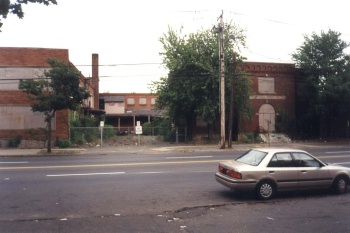
Before the 2001 razing of the Johnson Perfume Factory on Dixwell. Courtesy photo
By Sharon Bass
Local artists met with folks from the Mutual Housing Association yesterday to talk about a residential and retail development slated for Highwood. A sort of artist colony that’s been in the works since ’04 and is now picking up significant steam. Besides bringing affordable housing and more art to town, it’s hoped to be a catalyst in reviving the long-ignored neighborhood.
“[The artists] were very excited about the development,” said Shenae Draughn, director of real estate development for Mutual Housing.
Mutual’s plan calls for 27 affordable apartments and 15,000 square feet of retail and gallery/studio space on the old Johnson Wholesale Perfume property on Dixwell Avenue. The New Haven nonprofit agency just finalized its purchase of the town-owned parcel for $335,000 (the Legislative Council approved the sale last October). It also bought the building next door from the Highville Mustard Seed Corporation for $240,000 as well as 110 Columbus Ave. for $225,000. The project includes four buildings. The only structure Mutual will salvage is a small brick building. Everything else is coming down.
If all goes as scheduled, construction should start next spring and take one year to complete. This is the association’s first Hamden project.
“We couldn’t be more pleased that they stepped up and spent $800,000 of their own money so far,” said Economic Development Director Dale Kroop. “It’s a very positive thing for the Highwood community.”
The project must go through the Planning & Zoning Commission, the town Engineering and Fire departments and the state Department of Transportation, because Dixwell Avenue is a state road. It will need a special permit “because of the sheer size of it,” said Kroop. He expects the P&Z to review the plan in November and hold a public hearing. (Kroop previously said approvals would be done by September.)
The town has applied for $750,000 in bonding from the state Department of Economic and Community Development to help finance the artist colony, said Draughn.
Meanwhile, Kroop said Mutual should begin cleaning the contamination from the property. “We’d like to see some progress so they’re not starting on this next spring,” he said. Draughn said that would be done.
“We have really been researching a lot about green materials,” she said. Like solar panels, green roofs (gardens on top) and environmentally friendly interior building materials.
The results of an inquiry into the DEP’s conduct in the Newhall remediation project were released yesterday, but parts have been handed off to the AG
By Sharon Bass
The state Auditors of Public Accounts just wrapped up months of review on how the Department of Environmental Protection has handled the Newhall remediation project -- the largest residential cleanup in Connecticut history. Conclusions were issued yesterday.
While the auditors sided with the DEP on the rationale to expand soil testing outside the consent decree order, they asked the Attorney General’s Office to further investigate potential illegal contracting and improper distribution of state funds.
In response to the auditors' report, DEP Commissioner Gina McCarthy wrote: “It is clear from your report that actions this Department initiated to address contamination in the Newhall area were handled properly and conducted in a manner consistent with our responsibility to protect the public health and the environment.”
However, Keith Darden, one of 120 homeowners outside the consent boundaries whose property was deemed contaminated by DEP’s handpicked consultant, Loureiro Engineering Associates, had a different take on the auditors’ findings.
“It’s a whitewash of a report, but not completely,” he said. “They [DEP officials] can spin it all they want but the auditors were concerned enough that they referred it to the AG.”
Darden, who owns a home on Morse Street, and others in his neighborhood were notified last December that their yards were contaminated. Suspicious of the reports, they banded together and investigated. They tested their own soil, which they said came up within normal limits for common contaminants in the Northeast, and have been fighting the DEP ever since to leave them alone. They maintain LEA expanded testing to include more properties in the cleanup, using higher standards than the federal government’s, in order to reap more dough out of the project.
A Web site called DEP Newhall Community Blog was recently launched to give the public another version to what the state claims.
The consent decree originally included about 300 homes, the old middle school, Rochford Field and Mill Rock Park, which sit on top of old dumping grounds. The federal Environmental Protection Agency cleaned up the most highly contaminated properties several years ago. It's unclear whether more remediation is needed and if so, to what extent and at what cost.
The DEP is to announce its long-awaited cleanup plan tonight at Southern Connecticut State University to an anticipated huge crowd. The plan was supposed to be unveiled last December.
Meanwhile, millions of tax dollars have been spent on consultants, public relations, soil testing and lawyers -- but not a cent on cleanup. The town has forked over $3.48 million since 2000, when the Newhall remediation project kicked off. That money went to the law practices of Halloran & Sage and Cullina Murtha, architect Tai Soo Kim Partners, and engineers Haley & Aldrich and Metcalf & Eddy.
Since 2001, the DEP has gone through $2.45 million in state bonds for project consultants, with LEA receiving the bounty. Using a state master list of environmental contractors, in 2003 the DEP sidestepped the bidding process and awarded LEA an "emergency" $48,000, 30-day contract that could be extended 30 days. It was extended, but for three years and by $1.5 million, said state Rep. Peter Villano (D-Hamden). This is one of the issues the auditors sent to the AG to determine legality.
This June, LEA received a $5 million no-bid contract from the DEP -- while the auditors’ investigation was ongoing.
From the auditors’ report: “Our review disclosed that the Loureiro Engineering Associates has been billing the DEP for services rendered as far back as April 2003 exceeding the sixty (60) day maximum for emergency service contracts by almost three years.”
Still, DEP spokesman Dennis Schain said there was no wrongdoing.
“We believe verbal authorization [in lieu of a written contract] was permissible in this case,” he said. “The auditor’s report upholds the validity of the testing despite opinions to the contrary. It does raise issues about how we communicated results to the residents. That it could have been more effective communication. But it clearly says the protocols we used were proper and the test was valid.
“Please note it was a review, not an investigation,” said Schain “It was requested by elected officials, and we believe the conclusions show we conducted our activities in the Newhall neighborhood properly. DEP was in compliance with state laws and procedures.”
Darden said he eagerly awaits the attorney general’s conclusions. “We look forward to a qualified, thorough and expert investigation by the AG on the matters referred by the auditors as well as some scientific matters the auditors weren’t qualified to address, by their own admission,” he said.
At tonight’s meeting, Darden said he hopes to learn what the remediation proposal entails; if there would be health risks during the cleanup, which requires digging up contaminated soil and capping it with clean dirt; and if DEP’s plan is a permanent solution.
Site designed by Joanne Kittredge

Tip Us Off
Send
news tips






